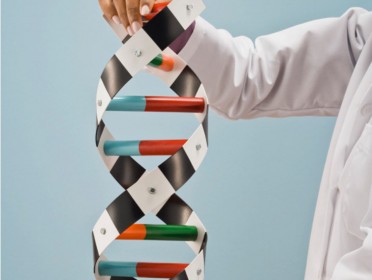
We arrive into the world with a mixture of DNA from our parents. We may have inherited mum’s dark hair or dad’s fiery temper, but ourgenetic heritage – and what happens to it during our life – could also be the key to avoiding deadly diseases such as cancer and diabetes.
Now there is an exciting new area of medicine, known as epigenetics, which studies the information superimposed onto our chromosomes by our life experiences.
Altered DNA
Epigenetics involves changes in our body that aren’t caused by mutations in our actual DNA. An example of a change that is not caused by mutations is the on-off switching of genes.
“It is a window into understanding the more important aspects of human biology,” says Professor John Mattick, executive director of the Garvan Institute of Medical Research and an expert in human genomics.
“We understand a lot of the mechanics of the system, the chemical modification of DNA and the proteins, but we understand very little about the pathways that alter that information,” Mattick says.
Epigenetics is important for normal development, health and brain function. There is roughly two and a half metres of tightly wound DNA in every cell of our bodies. Some cell changes dictated by our DNA are hardwired. It is what puts fingers and toes in the right places when a baby is developing in the uterus. It also strictly controls development through puberty to adulthood.
But scientists have discovered cell changes can also be infl uenced by our lifestyle and environment.
It is the reason why identical twins, who share the same DNA, may have differences in their personalities, how they look and behave and how prone they are to illness, particularly as they age.
Epigenetics now appears fundamental to the onset of diseases such as type 2 diabetes, cancers and various neurological diseases.
A range of influences
The extent to which environmental factors can trigger changes in DNA expression is not yet fully known.
It may be possible in the future to understand what effect episodes of joy or stress at certain ages have on the cells and whether that impacts our health.
Some experts believe events such as nurturing in childhood, a person’s social network, faith and stress may have an impact on cell behaviour. Evidence already shows psychological or traumatic events may affect not only a person’s own health but also that of future generations.
A Dutch study followed women who had endured starvation during World War II. Not only were their babies smaller than the European average, but so were their grandchildren. This is thought to have been the result of epigenetics.
Other research has suggested that diet and environmental toxins also play a role. “We are just starting to understand that all these things are very powerful to our development, health and the way that we think,” Mattick says. “We are at the outset of seeing how we might modify our lives and our circumstances and how such factors interplay with our own genetics.”
Drugs that interfere with the epigenetic process are already being developed to treat some illnesses. There is expected to be enormous changes in the next five years as the science develops.
Researchers are focusing on identifying early biochemical changes, such as those occurring during the development of cancer, with the hope of one day reversing such diseases.
Detecting diseases
Research could also mean better ways of detecting diseases such asovarian cancer, which is notoriously tricky to diagnose until in its late stages.
A team from the Garvan Institute of Medical Research has already had promising results using whole-genome DNA profiling, identifying six genes in ovarian cancer affected by the epigenetic process. While it is early days yet, the researchers were able to find a novel biomarker gene in 80 per cent of 100 tumours examined as part of the study.
After identifying cell changes, doctors are hopeful they may then be able to work out just what has caused the changes and, if possible, how it could be avoided.
Another focus of epigenetics research is the brain. This is an exciting area with the potential for new treatments for mental health disorders.
Research has also found possible epigenetic links to other health problems including osteoarthritis and obesity.
“We have just understood in the past decade that there is a whole other world of information transaction on our DNA that controls our development, predisposition and risk of disease, and which is almost certainly the basis of how we can learn to think and talk,” Mattick says.
Source: bodyandSoul
 We are sharing information for knowledge. Presented by. SocialDiary.Net
We are sharing information for knowledge. Presented by. SocialDiary.Net



